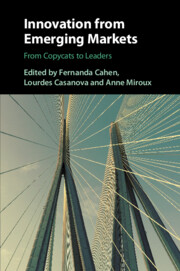Book contents
- Innovation from Emerging Markets
- Innovation from Emerging Markets
- Copyright page
- Contents
- Figures
- Tables
- Boxes
- Contributors
- Foreword
- Acknowledgments
- Introduction
- 1 A Framework for Innovation in Emerging Markets
- Part I Drivers of Innovation in Emerging Markets
- Part II Types of Innovation in Emerging Markets
- 7 The Political Economy of China’s R&D Internationalization
- 8 Emerging Pharmaceutical Companies from China, India, and Brazil
- 9 Reverse Innovation and the Role of Local Partners in Emerging Markets
- 10 Innovation Based on Value Co-creation through Employees at HCL Technologies
- 11 Frugal Innovation in Brazilian Multinationals
- 12 Innovation in War and Peace
- Part III Innovation Outcomes in Emerging Markets
- Conclusions
- Index
- References
12 - Innovation in War and Peace
How Colombian Conflict and Postconflict Triggered Military and Business Model Innovation
from Part II - Types of Innovation in Emerging Markets
Published online by Cambridge University Press: 15 March 2021
- Innovation from Emerging Markets
- Innovation from Emerging Markets
- Copyright page
- Contents
- Figures
- Tables
- Boxes
- Contributors
- Foreword
- Acknowledgments
- Introduction
- 1 A Framework for Innovation in Emerging Markets
- Part I Drivers of Innovation in Emerging Markets
- Part II Types of Innovation in Emerging Markets
- 7 The Political Economy of China’s R&D Internationalization
- 8 Emerging Pharmaceutical Companies from China, India, and Brazil
- 9 Reverse Innovation and the Role of Local Partners in Emerging Markets
- 10 Innovation Based on Value Co-creation through Employees at HCL Technologies
- 11 Frugal Innovation in Brazilian Multinationals
- 12 Innovation in War and Peace
- Part III Innovation Outcomes in Emerging Markets
- Conclusions
- Index
- References
Summary
Social unrest and warfare in emerging markets can create opportunities for innovation. By focusing on Colombia, where armed conflict and post-conflict challenges have motivated innovation in the military and business domains, this chapter examines innovation in places where social demands create opportunities for deep societal transformations. We describe the processes by which the armed forces developed innovative military strategies in wartime to win an unconventional and long-standing guerrilla war. During the post-conflict period, businesses created new business models, going much further than traditional practices of social responsibility to become real actors in building a peaceful society and contributing to the economic development of regions historically affected by the armed conflict.
- Type
- Chapter
- Information
- Innovation from Emerging MarketsFrom Copycats to Leaders, pp. 325 - 348Publisher: Cambridge University PressPrint publication year: 2021
References
- 1
- Cited by

